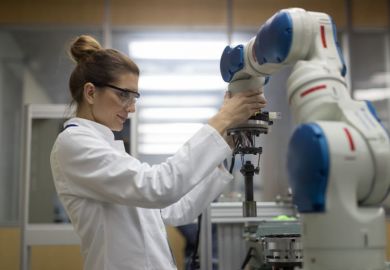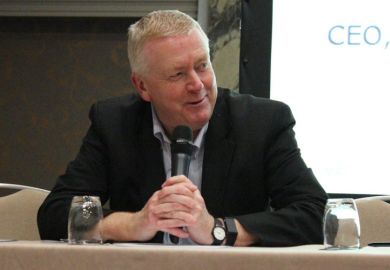It has been many months in the making, but the UK’s new research umbrella body – which brings together the country’s seven research councils alongside Innovate UK and the research functions currently held by the Higher Education Funding Council for England – is preparing to launch.
The formation of UK Research and Innovation, which will oversee the distribution of £6 billion in funding each year, has sparked significant debate among leading scientists about how much independence will be retained by the individual research councils under the new structure.
But Fiona Watt, the government’s preferred candidate to become executive chair of the Medical Research Council, has sought to reassure the academic community, insisting that individual research councils “will not lose their autonomy in the way that money is spent” to UKRI overseers.
The major shake-up of the UK’s research infrastructure is accompanied by concerns over a perceived tightening of control over research by the government, with some sector leaders highlighting the former role of Sir Mark Walport, UKRI’s chief executive, as chief scientific adviser.
Professor Watt, a world-renowned expert on skin stem cells, said that these concerns were unfounded.
“The direct interaction with government will be at one remove [and], for me personally, that’s fine,” Professor Watt told Times Higher Education. “I’m certainly not going into the role feeling [like] I’m going to lack the power to control the budget.”
Professor Watt, who will continue in her current role directing the Centre for Stem Cells and Regenerative Medicine at King’s College London, acknowledged that there was “some uncertainty” for existing MRC employees, but argued that this related to “what the terms and conditions will be of their employment and how their existing roles will map into this bigger structure”.
“I'm very keen to provide some clarity, stability and comfort that although things are going to change, it’s not a case of ransacking a well-structured organisation,” she said. Referring to the uplift in research funding planned under the government’s industrial strategy, “it’s more a case of looking at the opportunities afforded by more money in the system”, Professor Watt said.
Professor Watt admitted that securing the job was a “surprise” since she was convinced that she had only been invited to apply “to fill some sort of gender quota”.
“It’s a really unprecedented time in UK science,” she added. “The Brexit vote caused a lot of upset to a lot of scientists because we’re very international in outlook. I wasn’t exactly looking for a new job, but with all the changes taking place, I went for an interview with the attitude that it was like a perfect storm...whatever happened, it couldn’t just be business as usual and I found that very interesting.”
Rather than succumb to media-blown pessimism over the possible consequences of Brexit, she suggested that scientists see the changing research environment as a “positive picture” of the shape of things to come. “The creation of UKRI...makes a lot of sense,” she said. “On top of that, the announcement that the government is to commit more of its gross domestic product to research and development is massive for me. I remember lobbying [former science minister] Lord Sainsbury to do this when he came to a conference 20 years ago.”
With regard to increased pressure on UK scientists to translate research findings into commercial entities – as outlined in the industrial strategy – one of Professor Watt’s first priorities will be to help facilitate better interaction between research and industry.
“Translating basic science into clinical benefit...I think is really important,” she said. “The remit of the MRC is to spend taxpayers’ money to improve human health. You can’t do that if you don’t think about translation.
“The reason I moved to Guy’s [Hospital] was that I wanted to be physically embedded in a hospital. For me personally, that has been hugely positive. With the pressures on the NHS in mind, there are a lot of very able clinicians who have a PhD but their time is very limited – one of the things that I am very keen to do is facilitate those interactions.”
Speaking at a pre-appointment hearing held by the House of Commons Science and Technology Committee on 31 January, Professor Watt said that ethnic and gender diversity at the research body, “certainly on MRC committees”, could be improved. “I think that more could be done to get better ethnic balance especially, but having recognised that that’s something we have to work at, I’m optimistic that we could achieve it,” she said.
Asked if she felt “well remunerated” in the post in light of recent gender pay gap news headlines, Professor Watt replied: “It’s fine.”
Professor Watt takes up her role as executive chair on 1 April, when UKRI is officially launched.
POSTSCRIPT:
Print headline: Research councils will not sacrifice power to UKRI, says MRC nominee
Register to continue
Why register?
- Registration is free and only takes a moment
- Once registered, you can read 3 articles a month
- Sign up for our newsletter
Subscribe
Or subscribe for unlimited access to:
- Unlimited access to news, views, insights & reviews
- Digital editions
- Digital access to THE’s university and college rankings analysis
Already registered or a current subscriber?









